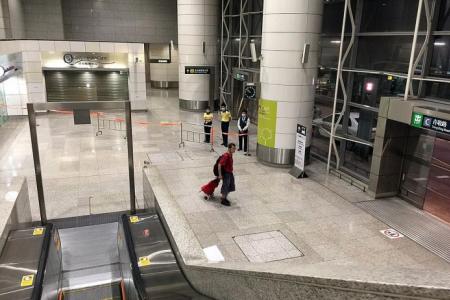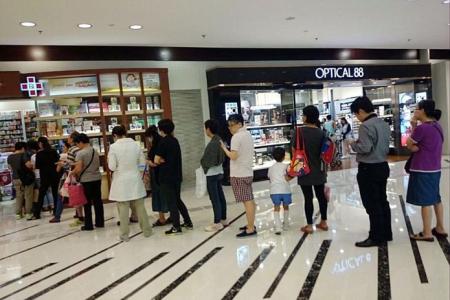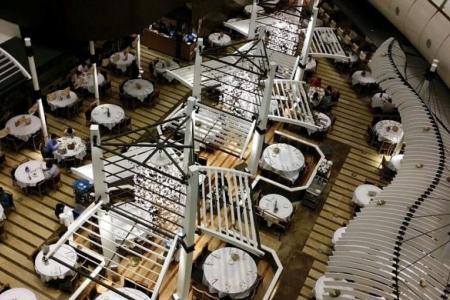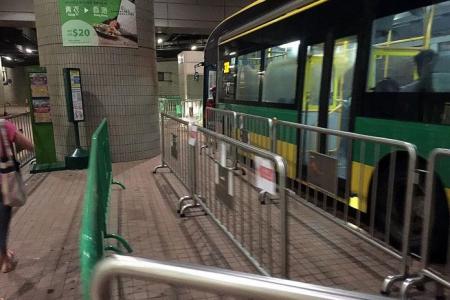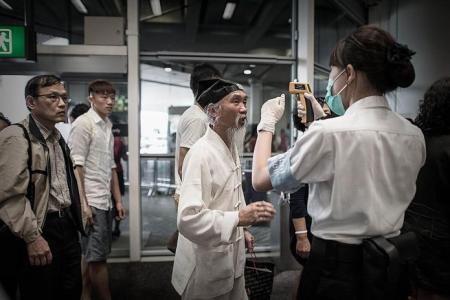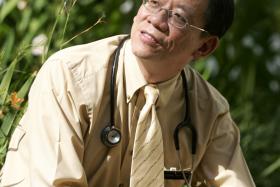HK train station where Mers suspect had been is deserted
Suspected victim had sought treatment at clinic in Hong Kong's Tsing Yi MTR station
The areas surrounding Hong Kong's Tsing Yi MTR Station has become a dead town, said some residents.
On Wednesday, Maritime Square - a shopping mall connected to the Tsing Yi MTR station - was deserted, though there was a slight improvement yesterday.
Many were avoiding the interchange station, which usually see tons of commuters, opting to take cabs instead.
There is a general sense of fear in Hong Kong after news broke on Wednesday that a woman suspected of having Middle East respiratory syndrome (Mers) had been rushed to Princess Margaret Hospital for testing.
The woman, who had sought treatment at a clinic in Tsing Yi MTR Station, had returned from Seoul and showed signs of fever and a running nose.
She became the first of four suspected cases of Mers who went to a clinic, the first of such incidents picked up outside of the airport.
The Mers virus is considered a deadlier but less infectious cousin of Severe Acute Respiratory Syndrome (Sars), which killed 299 people in Hong Kong in 2003.
There is no vaccine or cure for Mers. According to the World Health Organisation, it has a fatality rate of around 35 per cent.
A Hong Kong medical official said all 33 suspected cases of Mers had tested negative for the virus, reported news outlet Xinhua yesterday. (See report above.)
Madam Lai Sum Kuen, 60, who runs a stall selling children's clothes on Fa Yuen Street, told The New Paper: "I am scared. What if it becomes another case of Sars? I'm too old to experience another downturn."
She said she headed straight to a pharmacy to buy a box of masks after her son called to tell her the news.
"I cannot take the risk. We have 10 mouths to feed and only three of us are working," she said.
Mr Arik Poon, 50, a limousine driver, described Hong Kong as the "city of influenza". He said: "This is why we are always scared when there is a news of any outbreak."
Mr Poon, who claimed to be a Sars survivor, added that it took him four months to recover then.
"Now we can only pray for the best and hope everything turns out fine," he said.
Miss Lo Tze Tze, 28, a part-time student, said she wasn't surprised to see people shunning the mall.
"No one will dare go near until the all-clear has been given," she said. "Unless of course, you are living in Tsing Yi estate."
Residents of Tsing Yi are clearly staying alert.
When Madam Alexis Sum, 43, a housewife, read the news online, she rushed out to buy masks for her family of four, including her maid.
PHARMACY QUEUES
"There was a long queue at two pharmacies and people were saying there were no more stock, so I quickly took the MTR to Tsim Sha Tsui and bought five boxes," she said.
A woman who wanted to be known only as Mandy, who has two children aged three years and 10 months and lives in an estate a few stations away from Tsing Yi, is also cautious.
She said: "On my way home after work, it made me even more worried when I noticed that people were not wearing masks.
"I quickly put on my own mask to protect herself."
An executive who wanted to be known as Jacky said: "There is definitely some concern among us, especially because Hong Kong is a densely populated city. And because the virus is 'invisible', there is no way we can tell who could be affected."
He added that the experience of Sars had made them even more fearful.
Street peddlers and those running food and beverage outlets are keeping their fingers crossed that Mers will be kept at bay.
Mr Terence Tam, 45, a manager in a steamboat restaurant, said: "We cannot afford to lose more business.
"There has already been a drop in mainland visitors following the 'Occupy Protests' last year. If Mers hits us, I dare not imagine what will happen to our economy."
More cases in S. Korea, HK Mers-free
South Korea reported a 10th Middle East respiratory syndrome (Mers) death yesterday, as the outbreak of the potentially deadly virus forced the central bank to cut its key interest rate to ward off greater economic damage.
The 65-year-old man died after being infected with the virus while receiving treatment for lung cancer at a hospital.
Seoul also reported 14 new cases, including the first infection of a pregnant woman.
Bank of Korea governor Lee Ju Yeol said slowing exports and threats to business from Mers were central to the decision to cut its benchmark rate by a quarter percentage point, to a record low of 1.5 per cent.
Of the 14 new cases, eight were infected at Samsung Medical Centre in Seoul, a major hospital where 55 people have contracted the virus.
That is the largest cluster in the outbreak, AFP reported.
Meanwhile, all 33 suspected cases of Mers reported in Hong Kong tested negative, Xinhua reported the region's health authorities as saying yesterday. A 22-year-old woman had developed symptoms of fever and runny nose after returning from a trip to South Korea and attended a clinic in Tsing Yi, Hong Kong on Wednesday.
The clinic was then closed and areas around it were cordoned off for disinfection.
It reopened yesterday morning after the woman tested negative for the virus.
Residents of Hong Kong are particularly sensitive after an outbreak of Severe Acute Respiratory Syndrome killed 299 people in the city in 2003 and sparked global panic.
Get The New Paper on your phone with the free TNP app. Download from the Apple App Store or Google Play Store now

